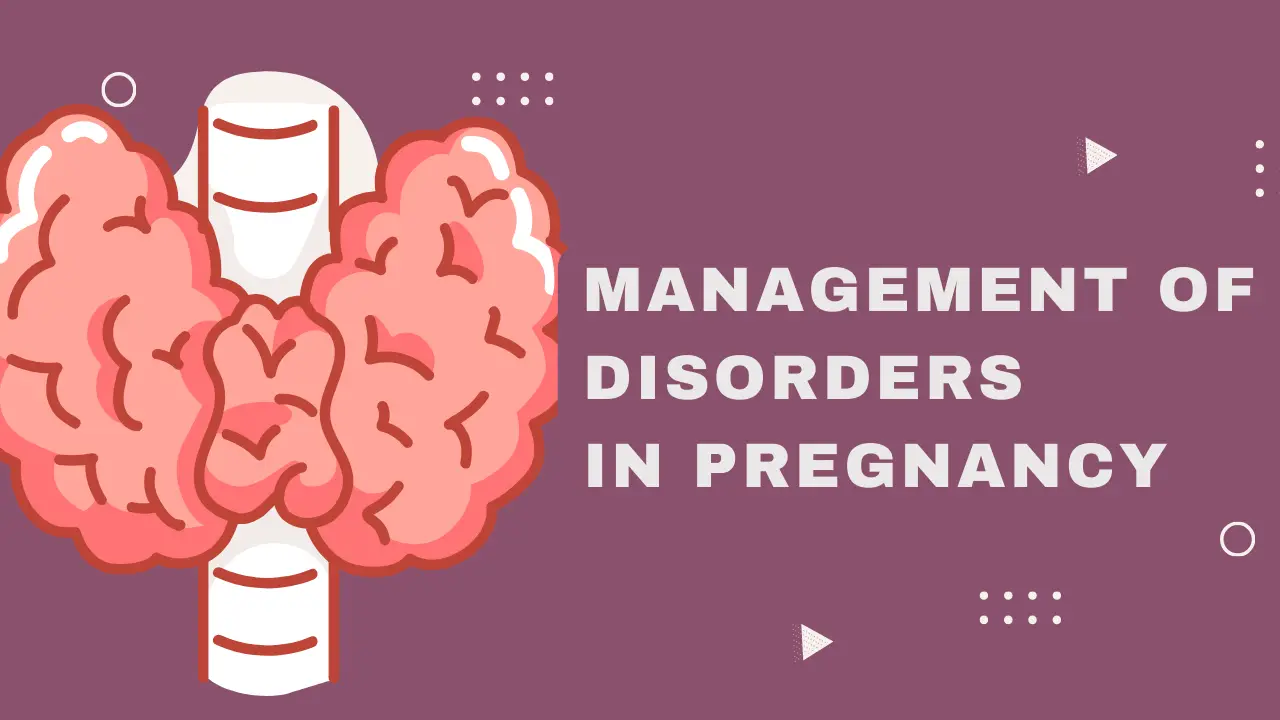Pregnancy is frequently accompanied by thyroid abnormalities, which can have a serious effect on the health of the mother and the fetus. To guarantee a healthy pregnancy outcome, thyroid problems must be appropriately managed during pregnancy.
The development of the baby’s brain and nervous system depends heavily on thyroid hormones, and any imbalance can have serious consequences. Thyroid disease sufferers who are pregnant should pay extra attention to their health.
This blog article will walk you through the process of managing thyroid issues during pregnancy, emphasizing critical actions including prompt diagnosis, suitable medication interventions, and important lifestyle modifications.
Anticipating women can enhance the protection of their own health and the wellness of their unborn children by comprehending and employing these management techniques.
Identifying Thyroid Disorders in Pregnancy:
Identifying thyroid disorders during pregnancy is a critical first step in the management of thyroid disorders in pregnancy. Early detection is essential to ensure both maternal and fetal health are maintained throughout the pregnancy.

Thyroid disorders, such as hypothyroidism and hyperthyroidism, can manifest in various ways, and recognizing these symptoms early can lead to timely intervention.
Common Symptoms and Signs
Pregnant women with thyroid disorders may experience a range of symptoms that can often be mistaken for typical pregnancy-related changes. Symptoms of hypothyroidism include fatigue, weight gain, cold intolerance, and constipation, while hyperthyroidism may cause weight loss, heat intolerance, increased heart rate, and anxiety.
Identifying these symptoms early is crucial for effective management of thyroid disorders in pregnancy.
Importance of Early Detection
Regular thyroid function monitoring and screening are necessary for the early diagnosis of thyroid problems in pregnancy. Thyroid disorders are frequently diagnosed with blood tests that measure thyroid-stimulating hormone (TSH) and thyroid hormone levels.
These tests are frequently part of routine prenatal checkups to make sure any thyroid irregularities are identified and treated right away. Complicated conditions like preterm birth, hypertension, and infant developmental problems can be avoided with early detection and treatment.
In order to ensure a safe pregnancy and lower risks for the mother and the unborn child, it is essential to properly diagnose and treat thyroid abnormalities in pregnancy as soon as possible. Thyroid health during pregnancy can be better managed by expectant mothers through diligent monitoring and routine screenings.
The Management of Thyroid Disorders in Pregnancy:
Management of thyroid disorders in pregnancy is crucial for optimal maternal and fetal health. The goal of treatment is to maintain thyroid hormone levels within the normal range. This involves close monitoring through regular blood tests to assess thyroid-stimulating hormone (TSH) and free thyroxine (FT4) levels.
For hypothyroidism, levothyroxine is the standard treatment. The dosage may need adjustment throughout pregnancy due to increased hormone requirements. For hyperthyroidism, treatment options include anti-thyroid medications, radioactive iodine therapy (generally avoided in pregnancy), and beta-blockers to manage symptoms. In severe cases, surgery may be considered.
Dietary iodine intake should also be monitored as it is essential for thyroid function. Regular consultations with an endocrinologist and obstetrician are vital to ensure optimal care and minimize risks associated with thyroid dysfunction during pregnancy.
Diet and Nutrition for Thyroid Health:
Diet and nutrition play a significant role in the management of thyroid disorders in pregnancy. A well-balanced diet that includes essential nutrients can help maintain thyroid health and support the overall well-being of both mother and baby.
Essential Nutrients for Thyroid Function
Certain nutrients are particularly important for thyroid health, and ensuring adequate intake of these can aid in the effective management of thyroid disorders in pregnancy.
Iodine: Iodine is a critical component of thyroid hormones. Pregnant women need sufficient iodine to support the increased production of thyroid hormones necessary for fetal development. Good sources of iodine include iodized salt, dairy products, seafood, and eggs.

Selenium: Selenium is another essential nutrient that supports thyroid function. It helps protect the thyroid gland from oxidative stress and is involved in the conversion of thyroid hormones into their active forms. Foods rich in selenium include Brazil nuts, sunflower seeds, fish, and whole grains.
Iron: Iron is necessary for the production of thyroid hormones and overall health. Iron deficiency can exacerbate thyroid problems, so it is important to include iron-rich foods such as lean meats, legumes, and leafy green vegetables in the diet.
Zinc: Zinc plays a role in thyroid hormone production and immune function. Foods high in zinc include meat, shellfish, legumes, seeds, and nuts.
Foods to Avoid and Foods to Embrace
Foods to Embrace: Including a variety of nutrient-dense foods in the diet can support thyroid health. Pregnant women should focus on incorporating fruits, vegetables, lean proteins, whole grains, and healthy fats. These foods provide essential vitamins and minerals that support thyroid function and overall health.
Foods to Avoid: Some foods can interfere with thyroid function and should be limited or avoided. Goitrogens, found in cruciferous vegetables like broccoli, cauliflower, and Brussels sprouts, can interfere with iodine uptake.

However, these vegetables can still be consumed in moderation if cooked, as cooking reduces their goitrogenic properties. Additionally, it is advisable to limit processed foods and those high in sugar and unhealthy fats, as they can negatively impact overall health.
Proper diet and nutrition are vital components of the management of thyroid disorders in pregnancy. By ensuring adequate intake of essential nutrients and making mindful food choices, pregnant women can support their thyroid health and contribute to a healthy pregnancy.
Working closely with a healthcare provider or a nutritionist can help tailor a diet plan that meets individual needs and promotes optimal thyroid function.
Lifestyle Modifications:
Lifestyle modifications are essential for the effective management of thyroid disorders in pregnancy. Adopting healthy habits can support thyroid function, reduce symptoms, and contribute to the overall well-being of both the mother and the developing baby.
Importance of Regular Physical Activity
Exercise: Regular physical activity is beneficial for maintaining a healthy thyroid and overall health during pregnancy. Exercise can help regulate metabolism, reduce stress, and improve mood.
Pregnant women with thyroid disorders should engage in moderate-intensity exercises, such as walking, swimming, or prenatal yoga, for at least 30 minutes most days of the week. Before beginning any exercise program, it’s crucial to consult with a healthcare provider to ensure it is safe and suitable for your specific condition.
Stress Management Techniques
Stress Reduction: Chronic stress can negatively impact thyroid function and exacerbate symptoms of thyroid disorders. Incorporating stress management techniques into daily routines is crucial for the management of thyroid disorders in pregnancy.

Techniques such as mindfulness meditation, deep breathing exercises, and progressive muscle relaxation can help reduce stress levels. Engaging in hobbies, spending time in nature, and connecting with supportive friends and family can also contribute to lower stress levels.
Sleep Hygiene Tips
Quality Sleep: Adequate and restful sleep is vital for maintaining thyroid health and overall well-being. Expectant mothers should aim for 7-9 hours of sleep each night. Establishing a regular sleep schedule, creating a comfortable sleep environment, and avoiding screens before bedtime can improve sleep quality.
If sleep disturbances persist, consulting with a healthcare provider is advisable to address any underlying issues.
Avoiding Toxins
Environmental Factors: Exposure to certain environmental toxins can interfere with thyroid function. Pregnant women should avoid exposure to chemicals found in certain cleaning products, pesticides, and plastics.
As far as possible, use natural and organic products to reduce your exposure to dangerous chemicals. Eating organic food and purifying drinking water are two more ways to further minimize exposure to environmental pollutants.
To summarize, lifestyle changes are essential for the treatment of thyroid problems during pregnancy. Important elements that support thyroid health include regular exercise, good stress management, restful sleep, and limiting exposure to pollutants in the environment.
Pregnant women can support a healthy pregnancy and better control their thyroid status by implementing these healthy habits.
Monitoring and Follow-up:
Regular monitoring and follow-up are crucial components in the management of thyroid disorders in pregnancy. Consistent oversight ensures that thyroid hormone levels remain stable, reducing risks to both the mother and the developing baby.
Importance of Regular Thyroid Function Tests
Thyroid Function Tests: Regular thyroid function tests are essential for monitoring thyroid hormone levels during pregnancy. These tests typically measure thyroid-stimulating hormone (TSH) and free thyroxine (FT4) levels.
The frequency of these tests may vary depending on the severity of the thyroid disorder and the stage of pregnancy. Early and frequent testing allows for timely adjustments in medication, ensuring that thyroid hormone levels remain within the optimal range for pregnancy.
Working closely with Healthcare Providers
Collaboration with Healthcare Providers: Close collaboration with healthcare providers, including endocrinologists and obstetricians, is vital for the effective management of thyroid disorders in pregnancy.
Healthcare providers can offer personalized care plans that include appropriate medication dosages, dietary recommendations, and lifestyle modifications. Regular appointments and open communication with healthcare providers help address any concerns and adjust treatment plans as necessary.
Adjusting Treatment Plans
Adjusting Medication Dosages: As pregnancy progresses, the body’s demand for thyroid hormones can change. Regular monitoring allows for adjustments in medication dosages to meet these changing needs. For example, women with hypothyroidism may require increased doses of levothyroxine to support the growing fetus.
Conversely, women with hyperthyroidism may need to adjust their antithyroid medications to prevent overtreatment. Adjusting medication based on regular test results ensures both maternal and fetal thyroid hormone levels remain balanced.
Preventing Complications
Preventing Complications: Pregnancy-related thyroid disease problems can be avoided with regular monitoring and follow-up. Thyroid diseases that are poorly controlled or go untreated can cause low birth weight, premature birth, preeclampsia, and developmental problems in the unborn child.
Thyroid function testing and routine follow-up visits help detect problems early and treat them to reduce hazards to the mother and unborn child. To sum up, careful observation and follow-up are essential to the successful treatment of thyroid problems during pregnancy.
Stable thyroid hormone levels and a lower risk of problems are ensured by routine thyroid function testing, close communication with healthcare practitioners, and prompt treatment plan modifications. Pregnant women can support a healthy pregnancy and better control their thyroid health by being watchful and following a detailed monitoring strategy.
Conclusion:
In conclusion, the effective management of thyroid disorders in pregnancy is crucial for ensuring the health and well-being of both the mother and the baby. Through regular monitoring, appropriate medical treatment, dietary and lifestyle modifications, and close collaboration with healthcare providers, pregnant women can maintain stable thyroid hormone levels.
By prioritizing the management of thyroid disorders in pregnancy, potential complications can be minimized, supporting a healthy and successful pregnancy outcome. Click to learn more.
FAQs:
- What are the common symptoms of thyroid disorders during pregnancy?
Common symptoms include fatigue, weight changes, sensitivity to temperature, and changes in heart rate.
- Why is regular monitoring important for managing thyroid disorders in pregnancy?
Regular monitoring helps ensure thyroid hormone levels remain stable, reducing risks to both mother and baby.
- Can thyroid disorders affect the baby during pregnancy?
Yes, unmanaged thyroid disorders can lead to complications such as preterm birth, low birth weight, and developmental issues.
- What dietary changes can help manage thyroid disorders in pregnancy?
A diet rich in iodine, selenium, iron, and zinc supports thyroid health. Including foods like seafood, nuts, lean meats, and leafy greens is beneficial.
- How often should thyroid function tests be done during pregnancy?
The frequency of thyroid function tests varies, but they are typically done every 4-6 weeks, or more frequently if needed, to adjust treatment plans effectively.
